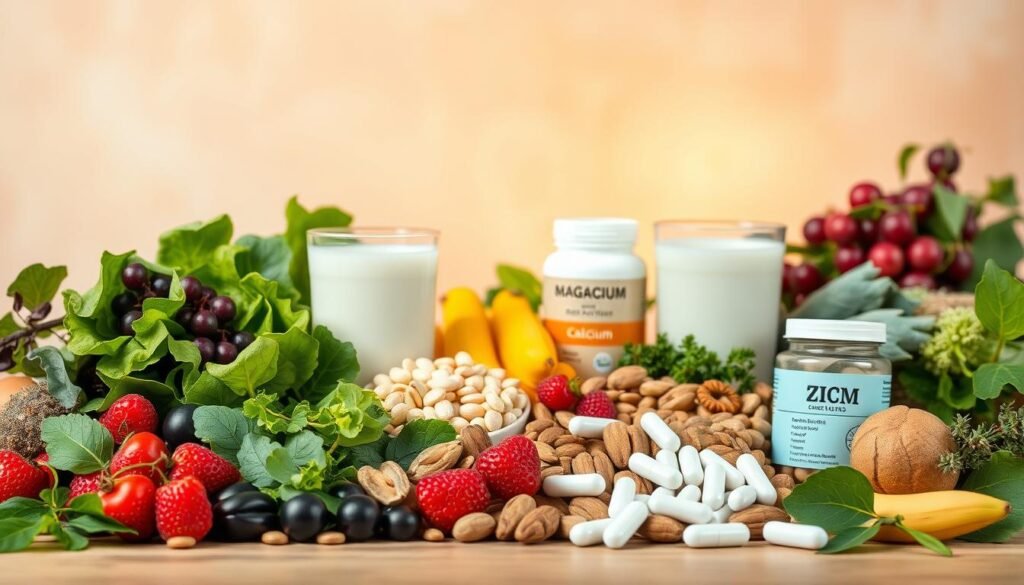When you hit your 70s, your body naturally undergoes changes. The best vitamins for seniors over 70 are key to filling nutritional gaps. A balanced diet is great, but many seniors find it hard to get enough vitamins like D and B12. This senior vitamins guide will help you choose wisely, based on science.
Getting older means your body absorbs nutrients slower and you’re at higher risk for deficiencies. This guide makes it easy to understand, focusing on vitamins that boost energy, strengthen bones, and improve brain health. It also talks about FDA oversight and how to find quality supplements.
Key Takeaways
- Seniors over 70 need 20 micrograms of vitamin D daily to support bones and immunity.
- Vitamin B12 deficiency raises heart disease and cognitive decline risks.
- Calcium intake should reach 1,200 mg daily to reduce osteoporosis risks.
- Choose supplements with USP or NSF certification for safety.
- Always consult a healthcare provider before starting new supplements.
Why Nutritional Needs Change After 70
As you get older, your body needs different essential nutrients for older adults. These changes are crucial for staying healthy and active. Let’s explore why they happen.
Age-Related Physiological Changes
Your body’s systems slow down with age. Stomach acid decreases, making digestion harder. Gut bacteria changes also affect digestion.
Even your skin’s ability to make vitamin D from sunlight weakens. This impacts bone health.
Medication Interactions with Nutrients
Many seniors take several medications. Some blood pressure drugs lower magnesium levels. Acid reducers like PPIs block B12 absorption.
Always talk to your doctor about supplement timing to avoid clashes.
Decreased Absorption Efficiency
Your body doesn’t absorb nutrients as well as before. For example:
- B12 absorption drops due to less stomach acid
- Vitamin D metabolism slows, needing higher intake
- Calcium absorption efficiency declines
| Nutrient | Daily Amount (51+) |
|---|---|
| Vitamin B12 | 2.4 mcg |
| Vitamin D | 600-800 IU |
| Calcium | 1,000–1,200 mg |
Even a balanced diet might not meet all needs. Nutritional supplements for aging adults can help. But choose options with USP verification for safety. Small changes today support energy, immunity, and long-term health.
The Best Vitamins for Seniors Over 70
Choosing the right vitamin recommendations for seniors is key to filling age-related gaps. Here are the top supplements for elderly adults to consider, based on the latest health advice.
Vitamin B12: Combating Deficiency and Boosting Energy
Many seniors find it hard to get enough B12 from food because of less stomach acid. You should aim for 2.4 mcg daily from fortified foods or supplements. Opt for methylcobalamin for better absorption. Signs of a lack include feeling tired and having memory problems.
- Sources: Clams, trout, nutritional yeast
- Tip: Pair with a B-complex supplement for balanced support
Vitamin D: Supporting Bone Health and Immune Function
After 70, your body needs 20 mcg daily to help with calcium absorption and immunity. Since making vitamin D from sunlight gets harder, consider a supplement with calcium-rich foods. Research shows it may lower infection risks.
Vitamin B6: Maintaining Brain Health and Blood Formation
Men need 1.7 mg daily, while women require 1.5 mg. It helps make neurotransmitters and red blood cells. Eat foods like chickpeas and tuna, but talk to a doctor before taking high doses.
Vitamin K: Essential for Blood Clotting and Bone Strength
Leafy greens and fermented foods are good sources of vitamin K. It’s vital for clotting and bone health. Aim for 90 mcg (men) and 90 mcg (women) daily. It works well with vitamin D to help use calcium better.
Essential Minerals That Support Aging Health
When looking at the best vitamins for seniors over 70, remember minerals too. They are key essential nutrients for older adults that work with vitamins. Minerals like calcium, magnesium, and potassium are crucial for bones, muscles, and heart health.

Calcium: At 70+, you need 1,200 mg daily to protect against osteoporosis. Dairy, leafy greens, and fortified plant milks are top sources. Pair it with vitamin D to boost absorption.
Magnesium: Aim for 420 mg (men) or 320 mg (women) daily. Nuts, spinach, and black beans help maintain muscle function and heart rhythm. Low levels can worsen diabetes or heart issues.
Potassium: Men need 3,400 mg and women 2,600 mg daily. Bananas, sweet potatoes, and yogurt support blood pressure and kidney health. Too little can strain your heart.
Zinc & Selenium: Small amounts matter. Zinc (from oysters or lentils) aids immunity, while selenium (in Brazil nuts) guards against cell damage. Too much selenium can cause hair loss.
- Include magnesium-rich almonds in snacks to ease stress and improve sleep.
- Choose salmon or fortified cereals for vitamin D to boost calcium use.
- Track potassium through bananas or white potatoes to lower stroke risk.
Talk to your doctor before adding supplements. Focus on whole foods first—they’re your best defense against deficiencies linked to chronic diseases.
How to Choose Quality Supplements for Older Adults
Finding the right supplements can be tough, but this guide makes it easier. Over half of seniors use supplements, so picking quality ones is crucial. Since the FDA doesn’t regulate them, third-party tests are your best bet. Look for USP or NSF logos to ensure safety and correct amounts.

USP/NSF Certifications Matter
Products with USP or NSF verification are pure and have the right amount. These marks mean no bad additives and better absorption. Always look for these labels.
Dosage Adjustments
Seniors might need special dosages. For instance, vitamin D and B12 might need more, while iron and A might need less. Be careful with fat-soluble vitamins. Always talk to your doctor before starting new supplements.
Form Options
- Liquid formulas are absorbed better but might have extra sugar.
- Gummies are easy to take but often have a lot of sugar.
- Powders mix well in drinks, great for those who don’t like pills.
- Pills/capsules are common but make sure they’re USP verified for proper breakdown.
Your guide should focus on forms that meet your health needs. For example, if swallowing is hard, gummies or powders might be better. Always pick options tested by USP or NSF.
Remember, eating a balanced diet is key. Your supplement choices should match your health needs. A reliable senior vitamins guide helps you find safe and effective options.
When to Take Your Vitamins: Timing and Absorption Tips
Getting the most out of top supplements for elderly starts with timing. Let’s explore when and how to take your vitamin recommendations for seniors for the best results.
Morning vs. Evening Supplementation
Match your supplements with your daily routine:
- B vitamins (B12, B6) in the morning to boost daytime energy.
- Magnesium or calcium at night to relax muscles and help sleep.
With Food or Without
Some supplements work better with food:
- Fat-soluble vitamins (A, D, E, K): Take with a meal that has healthy fats (avocados, nuts) for better absorption.
- Iron or calcium: Take with meals to avoid stomach upset. Avoid coffee/tea as they block absorption.
- B & C vitamins: Can be taken anytime, but with water to avoid stomach upset.
Potential Interactions with Medications
Some supplements and medications don’t mix well. For example:
- Calcium tablets with antibiotics may reduce their effectiveness—take them 2 hours apart.
- Vitamin K (in leafy greens) can weaken blood thinners like warfarin. Talk to your doctor about this.
“Never split or crush enteric-coated pills without medical advice,” warns the FDA.
Always keep a list of all supplements in your medication log. Review it with your pharmacist. Small changes in timing and pairing can greatly improve your health.
Signs Your Current Vitamin Regimen Isn’t Working
Wondering if your senior vitamins guide is working? Here are signs to look out for. If you’re always tired, have muscle cramps, or wounds heal slowly, it might mean your body isn’t getting the nutrients it needs. This includes the best vitamins for seniors over 70.
- Fatigue: Feeling extremely tired even after taking B12 or iron.
- Weak bones: Getting frequent fractures, even with calcium and vitamin D.
- Memory slips: Having trouble remembering things, even with B vitamins.
A senior vitamins guide might not cover everything. For example, some medicines can stop vitamin K from working right, which is bad for bones. Keep a journal to track your symptoms and see if they follow a pattern.
| Symptom | Possible Deficiency | Action Step |
|---|---|---|
| Slow wound healing | Zinc or vitamin C | Discuss blood tests with a doctor |
| Brittle nails | Biotin or iron | Adjust supplement form (e.g., liquid vs pills) |
| Constipation | Magnesium imbalance | Check dosage and hydration |
“Over 50% of seniors take supplements, yet many miss nutrient absorption due to age-related changes,” says a 2023 CDC report.
Think about getting lab tests for vitamin D, B12, and magnesium. If you’re spending money but not feeling better, it’s time to change your plan. A good senior vitamins guide will focus on what’s best for you, not just a general plan. Here’s how to adjust:
- Try new supplements 2-3 weeks apart to see how they work
- Take fat-soluble vitamins (D, K) with meals that have healthy fats
- Check your medicines for any interactions with nutrients
Remember, supplements work best when you eat well too. If you’re not feeling better, talk to a doctor to make your plan better.
Conclusion: Creating Your Personalized Senior Vitamin Plan
Your vitamin plan should match your health needs. Talk to a healthcare provider to get the right vitamins for older adults. First, check your diet, meds, and lab results to find what’s missing.
Many seniors need more B12 or D. Supplements can help. About 70% of seniors take vitamins. But, a plan made just for you is safer and works better.
Start with lab tests to find out what you’re missing. The National Academy of Medicine suggests B12 supplements after 50 because of absorption problems. Don’t just take generic multivitamins. They don’t prevent chronic diseases.
Focus on what your body really needs. For example, calcium is good for bones, and magnesium helps your heart.
Eat foods rich in nutrients like salmon, leafy greens, and fortified cereals. More than 90% of Americans don’t get enough vitamin D from food. So, supplements are key. Drink plenty of water and eat smaller meals if you’re not hungry. Avoid junk like chips or soda.
Check your plan every year or when your health changes. See how supplements affect your energy or lab results. A plan made just for you balances what you need with science. This way, you can support your health without guessing.
FAQ
What vitamins are essential for seniors over 70?
Seniors over 70 need vitamins like B12, D, B6, and K. Vitamin B12 boosts energy and brain function. Vitamin D helps bones and the immune system. Vitamin B6 is good for the brain. Vitamin K is key for blood clotting and strong bones.
How do age-related changes affect nutrient absorption?
Aging can make digestion less efficient. This leads to less stomach acid and a different gut. It makes it harder to absorb nutrients like Vitamin B12 and calcium. So, taking supplements is more important.
Are there any risks associated with taking supplements for seniors?
Yes, seniors might have problems with supplements and medicines. For example, some calcium supplements can stop antibiotics from working. Always talk to your doctor to avoid these issues and find out what you really need.
How can I choose quality supplements for myself or a loved one?
Look for supplements with USP verification or third-party testing. These ensure the product is safe and effective. Also, choose the right dosage for seniors, as they might need more or less of certain nutrients.
What time of day is best for taking vitamins?
Take B vitamins in the morning to boost energy. Magnesium might be better at night for relaxation. Always check if you should take your vitamins with food or on an empty stomach for better absorption.
How can I know if my vitamins are effective?
Watch how you feel and your overall health. If you still feel tired or have muscle cramps, you might need more. Talking to your doctor about blood tests can also show if your vitamins are working.
Can I rely solely on supplements for my nutritional needs?
Supplements should help, not replace, a healthy diet. Eating a variety of foods is key for good health. Use supplements to fill in any gaps, but only if you can’t get enough from food.
Source Links
- https://www.webmd.com/healthy-aging/what-to-know-about-multivitamins-for-seniors – What to Know About Multivitamins for Seniors
- https://www.oakstreethealth.com/top-10-vitamins-for-seniors-1246611 – Top 10 Vitamins for Seniors
- https://www.nia.nih.gov/health/vitamins-and-supplements/dietary-supplements-older-adults – Dietary Supplements for Older Adults
- https://www.nia.nih.gov/health/vitamins-and-supplements/vitamins-and-minerals-older-adults – Vitamins and Minerals for Older Adults
- https://www.mclarenhealthplan.org/mclaren-health-plan/news/essential-vitamins-and-minerals-for-seniors-5282 – Essential Vitamins and Minerals for Seniors | McLaren Health Plan News
- https://www.silversneakers.com/blog/supplements-older-adults-need-know-2/ – 5 Best Multivitamins and Supplements for Seniors – SilverSneakers
- https://www.webmd.com/healthy-aging/ss/slideshow-aging-vitamins-older-people – Things Your Body Needs as You Age
- https://www.cnet.com/health/nutrition/experts-say-these-are-the-6-vitamins-and-minerals-that-unlock-healthy-aging/ – 6 Vitamins and Minerals to Unlock Healthy Aging, According to Experts
- https://www.aarp.org/health/healthy-living/info-2023/essential-nutrients-for-healthy-aging.html – 9 Nutrients You Need More of As You Get Older
- https://www.silversneakers.com/blog/supplements-older-adults-need-know/ – 5 Best Multivitamins and Supplements for Seniors – SilverSneakers
- https://www.healthline.com/nutrition/a-definitive-guide-to-supplements-for-healthy-aging – A Definitive Guide to Supplements for Healthy Aging
- https://www.healthline.com/nutrition/10-of-the-best-supplements-for-healthy-aging – 10 of the Best Supplements for Healthy Aging
- https://www.centrum.com/learn/articles/nutrients-and-routine/how-to-take-vitamins-when/ – How to Take Vitamins and When You Should Take Them
- https://www.bannerhealth.com/healthcareblog/advise-me/vitamins-what-you-should-take-at-every-age – Vitamins Your Body Will Need as You Age | Banner Health
- https://www.hopkinsmedicine.org/health/wellness-and-prevention/is-there-really-any-benefit-to-multivitamins – Is There Really Any Benefit to Multivitamins?
- https://www.webmd.com/healthy-aging/features/missing-nutrients – Older Adults: 9 Nutrients You May Be Missing
- https://nutritionsource.hsph.harvard.edu/multivitamin/ – Should I Take a Daily Multivitamin? – The Nutrition Source
- https://medlineplus.gov/nutritionforolderadults.html – Nutrition for Older Adults: MedlinePlus


4 thoughts on “Your Guide to the Best Vitamins for Seniors Over 70”